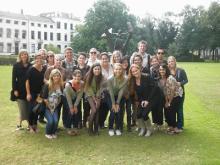Lily Fender and Liz Kent had been preparing for their study abroad trips for months before they left the country—the former to Amsterdam and the latter to Rome. They both went with Law, Societies, and Justice study abroad programs, and they had the opportunity to visit notable legal institutions and visit with working authorities to get a better feel for the nuances of the European system.
“I had been thinking about study abroad even during my freshman year. It just seemed like a perfect opportunity,” said Fender, a junior LSJ major. She had heard about it early fall quarter of last year, and had been keeping it on her radar since then.
Although each program focused on legal institutions, each had unique emphases. In Amsterdam, students chose between five research topics: drug policy, immigration policy, prostitution policy, policing, and punishment. In Rome, students all studied lawyering, immigration, privacy laws or criminal justice in seminars, and had groups in which to study one of these topics in particular .
Once split into groups, students visited professionals working in those concentrations. In Italy, some students got the opportunity to visit Italian Google and speak to the defense attorney of the Amanda Knox trial. Students in Amsterdam were able to go to the International Criminal Court of The Hague.
Professor George Lovell, a co-leader of the Rome program in the past who attended this year as part of the faculty, said, “The idea is that it comes to life and they get something out of actually being in Rome.”
“It was everything that I wanted it to be and more,” said Kent, a senior LSJ student. Going abroad to Rome influenced her enough that it made her want to go back, possibly for a spring internship through IE3. Although, as a senior, it might be hard to fit another trip into her schedule, she’s determined to make it work.“The problem with only being there for a month is that there are a lot of places you don’t get to, so I would love to go back,” she said.
Professor Steve Herbert, who co-led the Amsterdam program, said, “For me, it was everything study abroad could hope to be. Students, as I would expect from LSJ students, were really, really engaged. And Amsterdam is such a compelling city that it almost forces you to engage it.”
For Fender, that engagement began before departure. She and her fellow Amsterdam students participated in a spring seminar to learn more about the area and the government climate. They were also able to meet their fellow students on their trip abroad.
“I think that was actually one of the best parts of the program,” she said. “I loved going to a country with a lot of information about it. It’s nice to begin an interview or conversation with a little bit of background about someone’s place that you’re coming to and you’re studying.”
Both the Amsterdam and Rome groups consisted of about 22 students this year, not all of whom were part of the LSJ major. The Rome group also included some students from the law school, which Lovell stated created an “interesting dynamic” as they interacted with one another.
In addition to studying with peers with similar interests, students were also able to forge closer relationships with the professors and instructors leading the trip. The instructors didn’t just teach the seminar classes abroad—they also traveled across the field with the student groups.
Professor Lovell said, “Everything we do with the students; that’s part of the program.”
It’s something they hope to continue to do. Lovell said he personally liked the closer interaction he could get with students; as he normally teaches larger lectures, working with a small group of students was something he enjoyed.
Studying abroad offers students the opportunity to expand their horizons. As Lovell said, “Students are able to learn more about our political system here in the United States by going abroad.”
And, of course, one can’t ignore the fact that those who study abroad not only interact with their peers and those associated with the program, but also with the foreign countries themselves.
Fender appreciated that she saw first hand what she had read about in her studies. In Amsterdam, students interviewed politicians, police officers, former sex workers, and the owner of a “coffee shop”. They took various excursions. One took them to a nearby jail; another was a walking tour with community police officers through a Muslim-dominated neighborhood.
About Rome, senior Kent said, “You get to meet and mingle with people that you would never, ever have the opportunity to meet as a young student. You shouldn’t pass that up if you can go.”
This article was composed by Kristine Kim.
